Stem Cell Science in Action: NYSCF Introduces New Drug Discovery Platform at SNF Nostos Conference
News“My colleagues and I are delighted to bring the NYSCF lab to you here at SNF Nostos Health today, and to show you in real time how we have developed a new unique platform, combining the power of AI and biology, to harness the potential of stem cells to better understand – and cure – human disease,” NYSCF CEO Susan L. Solomon, JD, shared with the audience at the 10th annual SNF Nostos Conference in Athens.
The NYSCF Discovery Platform has the potential to distinguish between patients with a disease and healthy individuals, test drugs on actual patient cells, and accelerate precision medicine for all. How does it do it? Read on to find out.
Stem Cells Provide a Glimpse Into Patients
“At the NYSCF Research Institute, we can take a small blood sample, or apple-seed biopsy from anyone in this room, or anyone in the world, and make their stem cells,” explained Ms. Solomon. “Once we make your stem cells – which are essentially blank cells, we can turn them into any of the types of cells that make up our bodies: lung cells, heart cells, brain cells, etc.”
“We can make brain cells to study Parkinson’s disease or Alzheimer’s disease, PTSD, or mental health disorders,” she continued. “We can make pancreas cells to study diabetes and figure out how to actually tackle it. Any disease that we want to study, we now have the ability to make a laboratory model of the cells that are affected by the disease directly from patients who have that condition so we can understand the root cause of what is making people sick.”
Making brain cells from patient stem cells is especially important, because researchers cannot simply reach into someone’s brain and pull the cells out themselves. Dr. Fossati uses stem cells to study neurodegenerative disorders such as multiple sclerosis (MS) and Alzheimer’s disease.
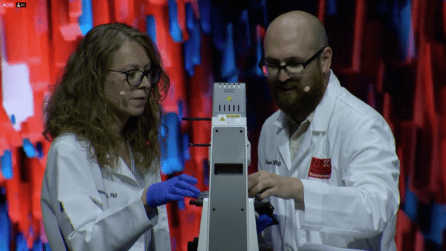
“As a patient myself, I want to figure out what causes MS, a disease that is still incurable because we do not know yet what is killing cells in the brain,” she remarked.
“Until the last decade, we were not able to study what is causing the cells to die in an MS brain, because we could not access it. I bet nobody would be willing to donate a piece of their own brain for research.”
Probably a safe bet. But with stem cells, scientists can make every type of brain cell in a dish, providing an unprecedented window into the body’s most difficult-to-study organ.
“Once we have these cells, we can study all diseases that affect human brains, such as MS, but also Alzheimer’s and Parkinson’s,” she noted.
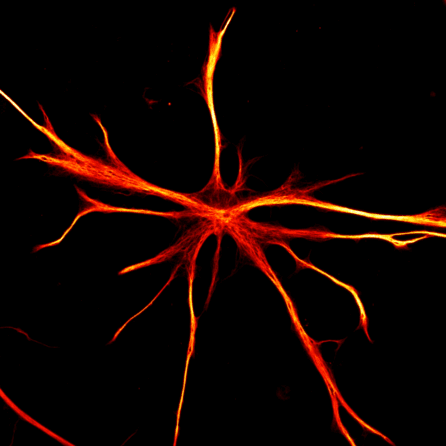
As part of our Precision Medicine Initiative with Johns Hopkins University, NYSCF is making stem cells from people with all different types of MS.
“Our studies led to the discovery of new mechanisms of cell death implicating a specific cell in the brain called ‘astrocytes’,” Dr. Fossati explained. “Under certain conditions, such as those found in neurodegenerative diseases, astrocytes can kill the neurons.”
Knowing this will inform the development of therapies that can hopefully prevent or stop astrocytes from ‘going rogue’ in the brain.
A New Drug Discovery Platform
While it’s great to look at one person’s cells, we need to study lots of people to understand how diseases differ across patients and determine which therapies will work for which groups.
“Valentina and I were able to handle about six samples at a time, but what if we could handle 600 samples at the same time?” posited NYSCF’s Daniel Paull, PhD. “We have automation technology [The NYSCF Global Stem Cell Array®] that we built so the work we do by hand can be done by robots.”
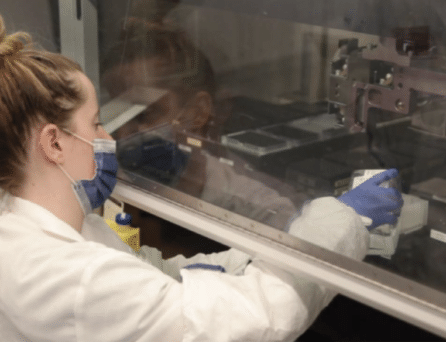
“These robots work 24/7: while I and the scientists back in New York are sleeping, we take photos of every single cell every night generating tens of thousands of images. But it’s not just overnight that it works: even being in Athens today, I can control my robots back in New York City.”
Dr. Paull then did just that – pulling up images of cells to illustrate one of research’s major bottlenecks. When it comes to studying cells, the human eye can only do and see so much, and we need to better understand the intricacies of diseased cells to figure out how to treat them.
“We can generate huge amounts of data very quickly, but human eyes cannot possibly look at every image and certainly every detail within every image,” noted Dr. Paull. “To help with this, we’ve turned to the same technology that is changing our everyday lives: artificial intelligence.”
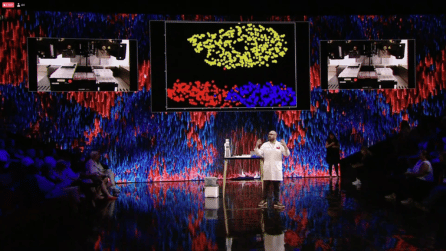
“Over the past few years we’ve developed a number of algorithms to help power our work in the lab. Most excitingly though, is the work we’re doing with imaging in identifying who has a disease just by looking at their cells.”
NYSCF scientists have recently put their AI-powered platform to the test using cells derived from patients with Parkinson’s disease.
“We can identify which samples come from healthy individuals and which come from Parkinson’s patients,” said Dr. Paull. “By putting those same numbers into a different algorithm, we can indeed see the emergence of two distinct groups: one on top the healthy individuals (in yellow) and one below, those with Parkinson’s.”
“As we continue to build enormous datasets that incorporate imaging of cells such as neurons, new biological insights will be unlocked,” he continued. “We’re also putting drugs onto these cells, not only new ones but pre-existing drugs, to see if we can repurpose medicines.”
The result of all of this? Better treatments for all.
Looking to the Future
“At some point in our lives, we or the people we love become patients,” remarked Ms. Solomon. “One of my sons has type one diabetes. I lost my parents to cancer and heart disease. And I am a cancer survivor.”
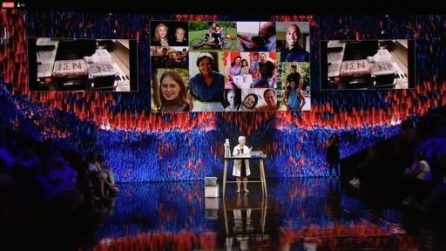
“I’m sure that my story or a similar one is familiar to most of you. And a version of it probably is your story. And that’s why stem cell research is critically important to every one of us.”
“Every day, NYSCF is re-defining what we know to be possible in science and medicine, and working with our collaborators to accelerate solutions for patients. We are leading a revolution – we are realizing personalized medicine.”
Join the revolution: give a gift today.
Stay tuned for the full video of the talk!
Learn more about NYSCF’s approach to stem cell research.